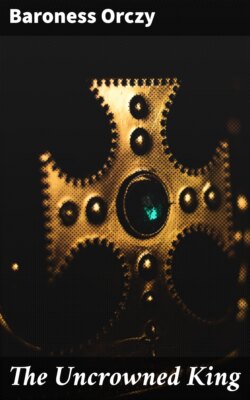Читать книгу The Uncrowned King - Baroness Orczy - Страница 13
На сайте Литреса книга снята с продажи.
1
ОглавлениеTable of Contents
Baden-Baden!! small city of beauty, of luxury and of dreams! of smart men and beautiful women!
From all accounts it must have been one of the gayest and most fashionable summer resorts in Europe in those days. One spoke of Baden-Baden then as one does of Monte Carlo to-day. It was the precursor, the parent of Monte Carlo. Fortunes were lost and won in the gaming-rooms; thousands were spent in diamonds, dresses and furs. Snobs entertained royalty, and royalty—some, that is—accepted hospitality, and bestowed gracious smiles indiscriminately on duchesses, or millionaires, or professional beauties, so long as they knew how to dress and how to order a dinner.
A perfect galaxy of elegancies, of notabilities, of financiers and snobs of all degrees thronged the beautiful parks for which the little city was renowned, and trod the velvety smoothness of its incomparable lawns. All—or nearly all—the greatest names in Europe were inscribed on the registers of the fashionable hotels. No less a name than that of Napoléon III, Empereur des Français, figures on one of these, side by side with that of Eugénie Impératrice. Leopold I, Roi des Belges, honoured the Hotel Messmer with a lengthy stay year after year, as did also King William I of Prussia and Queen Augusta. Otto Prince of Bismarck spent several weeks every summer in Baden-Baden, so did that super-Parisian the Duc de Morny, and the eccentric Princesse Metternich, with her starchy lord.
Then there were the notabilities in every branch of art, princes of finance and kings of industry: Ernest Meissonier invariably rented a studio for the season in the Werder Strasse, and Puvis de Chavannes could be seen daily drinking the waters at the Hot Springs, his sketch-book temporarily tucked away in his pocket. Henri Murger, already a very sick man, was polishing up the final chapters of his Vie de Bohème, whilst Giacomo Meyerbeer capped his many eccentricities one summer by appearing on the promenade dressed in woman’s clothes and riding a donkey. Mme Rachel, the great tragedienne, had her young granddaughter Sarah Bernhardt with her one summer, the year that Victorien Sardou wrote his La Patrie expressly for her, and there was a very lovely young Italian, by name Adelina Patti, who could be seen daily in the sylvan glades of Lichtenthal, dreaming, no doubt, of coming triumphs whilst gazing with good-humoured envy on the world-famous Jenny Lind.
And all day long in forest walks and down the river bank it was perpetual chattering and laughter, as if a bevy of birds had been let loose on this enchanting corner of God’s earth. At all hours of the day restaurants or cafés were crowded, and there was loud popping of champagne corks and great rattle of crockery and silver; at all hours save for an hour or two in the afternoon, when, tired out with pleasure and drowsy with good cheer, men of the world and women of fashion, crowned heads and creative minds sought in their respective hotels or apartments the quietude of sleep.
